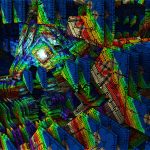technocapitalism
Off Center Episode 15: Surveillance Microcosms with Mathias Klang

Scott Rettberg and Mathias Klang discuss the panopticon of surveillance and our problematic relationship with the devices that make our lives easier — while also eroding our privacy.
Off Center Episode 14: Machine Vision with Jill Walker Rettberg

Rettberg and Rettberg discuss Jill's new book on machine vision and, in doing so, cover the mythological origins of surveillance, cybersemniotics, and the role of fear in the technologization of Western society.
Who Sees with Machines? A Review of Jill Walker Rettberg’s (Perhaps Not So) Posthuman Book on Machine Vision

Lea Laura N. Michelsen reviews Machine Vision: How Algorithms are Changing the Way We See the World by Jill Walker Rettberg. Machine vision is all around us, for good and bad, but who has the power to influence how we use it?
Infopower and the Ideology of Extraction

By engaging with Colin Koopman's work on the politics of information, Stephan Paur has a look at the technologically sophisticated ways that human beings are now at the mercy of our datasets. Rather than inhabiting a physical, populated place and taking part in communities, “the informational person” is increasingly outsourced into such things as birth certificates, personality profiles, racialized credit and other extractive ideologies.
Contemporary Posterity: A Helpful Oxymoron

In his essay, Malthe Stavning Erslev approaches the notion of post-digital from the perspective of a broader cultural phenomenon of posterioriy, emphasizing the fact that the prefix post- still allows for discussion of multidirectional and complex changes that our world is currently undergoing. In order to better grasp all the complexities and interrogate somewhat linear periodization implied by the prefix, Erslev employs the oxymoronic concept of contemporary posterity. At the same time, he ties his theoretical proposition with the extensive analysis of an online community engaging in bot-mimicry.